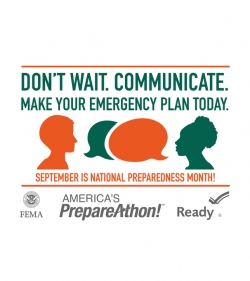NATIONAL PREPAREDNESS MONTH - BE PART OF THE SOLUTION
NATIONAL PREPAREDNESS MONTH
“BE PART OF THE SOLUTION”
If a disaster were to strike EKU, could you be part of the problem or part of the solution? September is National Preparedness Month and a time to remind ourselves that there are things we can know and do to be prepared for possible emergency events. Academic institutions nationwide face threats from a multitude of major hazards. On February 5, 2008, an EF4 tornado struck the center of Union University in Jackson, Tennessee, trapping students in the fallen rubble; 51 students were taken to the hospital. One year earlier, on March 1, 2007, Enterprise High School, in Enterprise, Alabama, was struck by an EF4 tornado; the death toll was 8. On November 6, 1977, the Kelly Barnes Dam failed taking 39 student lives at Toccoa College, Georgia. Who can forget the Virginia Tech Shootings and others. Madison County is sometimes in the crosshairs of tornadoes and, so far, they have missed EKU. A May 8, 2009, Madison County tornado traveled 21 miles on the ground, resulting in two fatalities and many injuries.
It is good advice to follow preparedness guidance from Federal, State and local emergency management agencies, to keep on hand an emergency supply kit with food, water and other essential items. For specific information on how EKU is preparing, visit http://www.emergency.eku.edu/. Acquiring knowledge about emergencies, how to help, even on a somewhat professional basis, is important in being part of the solution. To meet this need, EKU has a Bachelor’s Degree program that teaches the critical knowledge areas of the profession of emergency management. Through the Homeland Security Program in the College of Justice and Safety there is a well-designed curriculum on emergency management taught by professors with backgrounds in the field. Students can Major in Homeland Security which includes emergency management or take a Minor in Emergency Management. Both options represent fascinating and rewarding job markets in government and the private sector. A Minor in Emergency Management indicates to your future employers that you have value-added interests that contribute to corporate disaster resilience, through your serving on the corporation’s preparedness planning committee.
Besides academic opportunities at EKU, the university has an emergency management office in the Division of Public Safety, where Gary Folckemer is the EKU Emergency Manager. Mr. Folckemer recently earned his MS degree in Safety, Security and Emergency Management at EKU and has benefitted professionally from his education in this field. He believes that being part of the solution during emergencies through education is something that each of us can strive for, being a strength during such potential events.
Each year National Preparedness Month is a busy time for EKU Emergency Management students and faculty. Every year they participate in a variety of disaster exercises with local and State emergency managers, and the Federal Emergency Management Agency. These learning opportunities remind us that at some point in our lives we may face a disaster and being prepared is to be part of the solution. As one example, Dr. Fred May, professor in the EKU Homeland Security Program explains that in the aftermath of Hurricane Katrina, there were many people standing in long food lines because they were not prepared. These included people from all walks of life. Education is not a measure of being prepared. In fact, it seems the opposite. The more education we have often means the less prepared we seem to be. Safety comes first. You can break this cycle by being prepared both materially and through knowledge.
Dr. Chad Foster of the EKU Homeland Security program notes that emergency management principles and practices transcend and support many career paths. For example, many jobs in public health and the environmental sciences deal with preparing for, responding to, and recovering from disasters, plus mitigating the hazards that cause them.
Make it a priority - be part of the solution.
For additional information contact Dr. Fred May at Fred.May@eku.edu , Dr. Chad Foster at Chad.Foster@eku.edu, or Mr. Gary Folckemer at Gary.Folckemer@eku.edu. Also visit the EKU Homeland Security Degree Program website at http://homelandsecurity.eku.edu/ .
Published on September 01, 2015
